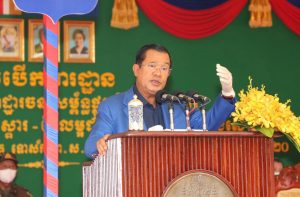As the world begins the long pivot from COVID-19 containment to measures to quash it with the procurement and distribution of vaccines, Cambodia has joined the list of countries that are moving to secure access to the vital inoculations.
On December 7, Cambodia’s Prime Minister Hun Sen announced that he had instructed the Ministry of Economy and Finance to prepare a budget for the purchase of 1 million vaccine doses. “I have instructed the Minister of Health and the Minister of Economy and Finance to be prepared,” the Cambodian leader posted on Facebook. “Save money to buy this vaccine and give it to our people for free as a first step.”
He said that these would be doled out free of charge to frontline medical workers and others at high risk of contracting the disease.
Most interestingly, the announcement prompted a flurry of donations from prominent tycoons closely associated with Hun Sen’s Cambodian People’s Party (CPP), intended for the purchase of vaccines. According to the de facto state mouthpiece Freshnews, the roster of the rich includes many names that have long been familiar to Cambodia-watchers.
Among them was Kith Meng, the chairman of Cambodia’s Royal Group conglomerate, who donated $3 million for Hun Sen’s vaccine purchase. A further $1 million was donated by Sok Kong, the chairman of Sokimex, which for years had the lucrative ticketing rights to Angkor Wat, and the tycoon Ly Yong Phat ($3 million), who has tentacular interests in everything from safari parks to power generation.
Another $3 million was donated by CPP Senator Lao Meng Khin and his wife, Choeung Sopheap, also known as Yeay Phu (“grandma Phu”). Sopheap is the head of the firm Pheapimex, which at one stage controlled 7.4 percent of Cambodia’s total land area through a string of controversial logging and economic land concessions.
Also among Hun Sen’s gaggle of “philanthropists” (as the pro-government Khmer Times termed them) were the Peng Huot Group ($3 million) and Chip Mong Group ($3 million), two prominent business conglomerates, as well as the tycoons Leng Navatra ($1 million), Hong Piv ($3 million), Pung Kheav Se ($3 million), and Kok An ($1 million).
On December 9, Hun Sen announced that the government had a total received $30 million in donations from these prominent individuals, with the likelihood of more to come.
All of the above are hardy perennials of the Cambodian neo-patrimonial state. Perhaps the most interesting name on the list was that of Chen Zhi, a Chinese national and naturalized Cambodian citizen who has shot out of obscurity over the past five years to become one of the country’s most prominent businesspeople.
Since 2014, the year in which he gained Cambodian citizenship, Chen and his Prince Group of companies have invested more than $1 billion into corporate ventures across Cambodia, from real estate to banking. In July of this year, King Norodom Sihamoni granted Chen the title oknha, an honorific that is granted to the CPP’s most generous benefactors (and attaches to the names of most of the above luminaries).
Given the opacity of the CPP’s inner workings, lists of donors to the CPP and its galaxy of charitable institutions offers a sense of who currently enjoys a prominent perch in the Cambodian political firmament. The donation drive also illustrates the continued centrality of private networks to Hun Sen’s 35-year rule. While the Cambodian government has considerably increased its tax revenue collection capacity in recent years, the national budget is paralleled by a financial pipeline linking important individuals, from CPP grandees to businesspeople to members of the security forces.
Hun Sen calls upon these tycoons and powerful individuals to provide public services bearing the CPP’s stamp – including roads, Buddhist pagodas, and schools – and these favors are in turn repaid via preferential access to resources and business opportunities. These reservoirs of liquid capital are not subject to state oversight, and thus help to reinforce Hun Sen’s personal control over both the party and the state.
The next step in this dance is not hard to guess. Despite gaining the support of opposition leader Kem Sokha, the provision of COVID-19 vaccines – whatever the provenance of the funds that procured them – will be done in such a way as the present them as a gift of Hun Sen, the CPP, and its meshed network of wealthy benefactors.
Even in a time of pandemic, the wheel of Cambodian patronage keeps on turning.

































